Can the Theravadan Buddhist approach to wisdom co-exist alongside the modern, imported knowledge of the Kingdom of Thailand? That is the question asked by author Zane Ma Rhea as she takes a closer look at traditional concepts of knowledge and wisdom in the face of an increasingly globalized Thailand.
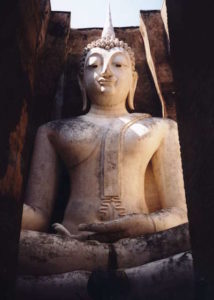
To start, Ma Rhea explains some of the nuances of knowledge and wisdom according to Buddhism and Thai culture. There are multitudes of folk tales explaining Thai wisdom, and more importantly, these tales derive from phumpanjaachawbaan (indigenous Thai rural wisdom) combined with panjaathaangtham (Buddhist higher wisdom). And as Ma Rhea describes, there is newer concept called panjaathaangloog (worldly wisdom). The author further clarifies the relationship between these concepts and points out the two primary forms of wisdom. The first, Buddhist higher wisdom, is a pathway to enlightenment based on the understanding of Buddhist teachings. In contrast, worldly wisdom is the path to becoming a wise person, including local knowledge that has proven useful to the larger group.
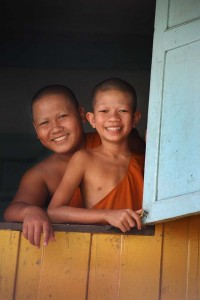
However, knowledge, which is different from wisdom but works in conjunction with it, is in need of defining as well. Like wisdom, knowledge comes in multiple forms. There is khwaamruudiikhàa (transcendental knowledge), which supports Buddhist higher wisdom. Then, there is khwaamruusàmăimài (modern knowledge), which supports worldly wisdom. Still yet, modern knowledge is made up from the constantly changing khwaamruuthaangsangkhom (local knowledge) and khwaamruutjaagpaajnoog (outsider knowledge). Of these, Ma Rhea points out the interesting link between outside knowledge and local knowledge since they lead to modern knowledge, and ultimately to worldly wisdom. In other words, change is to be expected and may emerge from difference sources.
Ma Rhea also takes a look at Buddhist higher wisdom and the path to enlightenment. The transcendental knowledge that leads to enlightenment is actually achieved through, and made up from, three types of knowledge collectively called the siinsamaadipanjaa (knowledge of morality, concentration, and insight understanding). However, the siinsamaadipanjaa has shifted somewhat into a moral behavior and the need to live a good life rather than forming the foundation of transcendental knowledge.
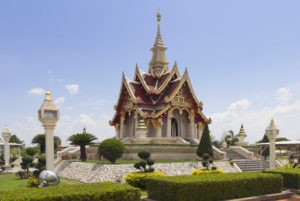
As opposed to the path to enlightenment, Ma Rhea found that the path to a wise life might be achieved through worldly wisdom. Not surprisingly, traditional Thais see this worldly wisdom as comprised heavily of rural wisdom. But putting all this into modern context, the value of rural wisdom, which was once relied upon for accumulated knowledge, is now less valued since the older generation has less experience in the modern world and the relevance of their knowledge questioned.
Outside knowledge acquired from universities and overseas studies has always been valued for its potential to bring information back home to assist in building a stronger economy and bracing for global change. Although some people saw outside knowledge as potentially harmful, it was still considered important for its role in building a more resilient country. In the end, worldly wisdom holds a place of importance, with or without rural influences.
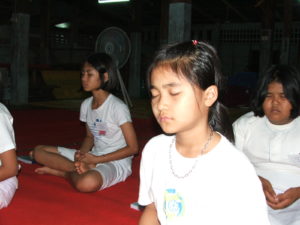
Many of the changes Ma Rhea describes came out of the secularization of education. However, there were also expectations that a distinct ‘Thai’ culture would remain despite this. In many ways this goal is actually being achieved since Thais are not merely ‘reproducing’ overseas knowledge, but are often adapting it to local conditions and Thai worldviews.
Ma Rhea also learned that modernization is still seen as a useful means of tying Thai knowledge and wisdom to a ‘globally interconnected world.’ Helping to ease this transition is the Thai understanding that modernization does not conflict with modern wisdom so long as it is balanced. This is possible since, for Thais, there is no distinction between the brain and the heart as in Western thought. As a result, neither Buddhist higher wisdom nor worldly wisdom can happen when only the brain is trained. It is this aspect of Thai culture that, more than any other, assures the balance of the modern and global with that of the traditional and local. Schools and universities are even attempting to impart Buddhist higher wisdom into their studies by having students do voluntary work in local villages as well as participate in religious extracurricular activities in addition to their secular studies.
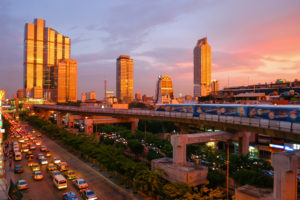
All told, it is the emergence of modern knowledge, both local and imported, that has allowed the social and cultural transformations currently seen in Thailand. Yet, there are still challenges in balancing rural wisdom with modern concepts of knowledge. As one informant put it, the hardest part of these changes is to “hear the wisdom of the ancestors” after having an overseas education (p. 647). But as Ma Rhea suggests, there is still time to balance the old and the new as Thais of all ages and backgrounds carefully navigate traditional pathways in a globalized world.
Ma Rhea, Zane. 2013. Buddhist Wisdom and Modernization: Finding the Balance in Globalized Thailand. Globalizations, 10: 635-65.
By Sherrie Alexander, University of Alabama at Birmingham